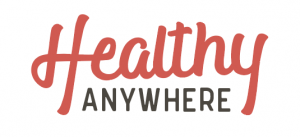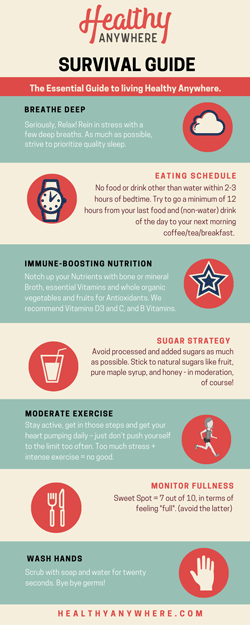
Here are 5 strategies to elevate your health and care for your immune system.
Nutrition!
Put good things into your body and expect more good to come out of it. This includes a healthy immune system.
Just how is nutrition tied to the immune system, you might wonder?
- Healthy diversity is key. You want to feed the widest variety of gut bacteria possible, through a wide variety of real, whole foods.
- Especially eat lots of plants – and lots of different types of plants. Plants tend to have good fiber, which is essential for gut health.
When it comes to gut health, a robust healthy diversity is best. An ongoing non-profit project, the American Gut Project reports that the more plants you eat, the better – and the more diversity of the plants you eat, the better. In fact, they found increased levels of anti-inflammatory CLA (conjugated linoleic acid) in individuals who ate 30 or more different types of plants each week3.
So what specific foods help feed a healthy gut and healthy immune system? Here’s a list:
- A wide variety of whole foods including fresh vegetables & fruit – brightly colored for antioxidant protection. Look for deep greens (kale, chard, spinach, collards), deep blues (blueberries, blackberries), bright purples (cabbage, radish), reds (bell pepper, raspberries, tomatoes), oranges (carrots, bell pepper), and all shades in between. Try something different like watermelon radish, turnips, parsnips, or kohlrabi when in season.
- Cultured or Lacto-fermented foods, like sauerkraut and kimchi – or natto. Yogurt is great, so long as dairy is tolerated.
- Healthy Fats: Omega-3s from coldwater fish (wild salmon, sardines) or fresh ground flax seeds. Monounsaturated oils like Extra virgin olive oil or Avocado oil.
- Sustainable meats like organic pastured chicken and limited amounts of organic pastured red meat like lamb or beef. Bone broth made from any of these provides exceptional nourishment and soothing for the gut.
- Garlic* and Onions. Part of the allium family, alongside shallots, leeks, and scallions. Alliums contain organosulfur compounds that are immune-boosting and health-promoting, with benefits ranging from decreased inflammation and blood pressure to increased heart protection and potential cancer protection. As a rule of thumb, the more pungent the taste, the stronger the antioxidant protection. Press or mince whole raw garlic for use in salads, dressings, or avocado toast. Go for the bolder flavored red or yellow onions – or select smaller onions for a more powerful punch4.
- Polyphenols in coffee, tea, and red wine – in moderation. Studies have shown that just 1 glass of red wine per week can help promote microbiome diversity5,6. Of course, too much alcohol can wreak havoc on gut ecology – so if you’re not able to handle moderation, it may be best to avoid altogether.
Other gut and immune ‘sabotage agents’ include refined sugars and refined carbohydrates, artificial sweeteners, trans fats, and oxidized fats. Avoid these like the plague. (pardon the pun)
2. Vitamin D status
The research here is compelling. Vitamin D is not only a bone-health facilitator but also a key immune function modulator. Of course, your body makes Vitamin D in the presence of sunlight, but most of us don’t get anywhere near the kind of sun exposure needed for healthy levels (nevermind the dermatological concerns).
Vitamin D levels below 30 ng/mL put you in the danger zone – at risk for infections and autoimmunity7. Many functional medicine experts want you closer to 60-80 for “optimal” immunity.
Personally, I’ve been holding steady at 53 ng/mL for over 10 years and have consistently taken Vitamin D3 daily. I worked through the dosage with the help of a medical professional and recommend you do the same. Don’t start supplementing before you know your actual Vitamin D serum level – then you can work with your healthcare professional to determine what dosage might be right for you. Ask your physician for the 25-hydroxy (25-OHD) blood test for Vitamin D level.
3. Stress Management
The Goldilocks principle applies here. We want just the right amount of stress – not too little and definitely not too much. Stress can make us more resilient and productive; but in excess, stress can tear down immunity. Key is to know and honor your threshold for stress. With a pandemic on the horizon, you may now want to take steps to dial back any stress you can control, and prioritize self-care. Take time to breathe deep, stretch, meditate, and unwind. The road ahead is always uncertain, though it seems even more so today.
With stock market dives, election uncertainty, and fears around productivity and life as we know it changing – keep focused and calm. This is a moment in time, and we will get through it. Take the long view.
4. Exercise
Goldilocks makes another appearance with exercise. Did you know exercise literally is stress? It’s typically good stress, that energizes us and regulates a healthy metabolism. But too much stress (i.e. exercise), as mentioned above, is just that – too much. Take care you don’t overwork your body and deplete your immune system by pushing too hard for too long, too often.
5. Sleep
Lack of sleep also qualifies as stress. Ongoing impaired sleep disrupts hormones and can result in elevated cortisol, blood sugar, and risk for illness and disease. Aim for 7-8 hours a night. If helpful, establish a wind-down routine to help you settle into bed. Try to avoid electronics before bed and certainly while you’re in bed, as tempting as it may be to reach over and see ‘all you’ve missed’ at 3 am!

A word of caution: Be careful with ‘immune-boosting’ supplements, herbs, teas, adaptogens, mushrooms, etc.
While it may seem a great idea to load up on all the immune-boosting extras you can get your hands on, know it is possible to rev up your immune system too much – to the point it literally attacks your own healthy tissues. You don’t want this! And if you have one or more autoimmune disease(s) or are predisposed to autoimmune – I would leave these alone, as it’s not worth the risk. Focus on the healthy nutrition and immune-supportive lifestyle measures described above.
In terms of preparation for a pandemic itself, I defer to the experts at the CDC.
Physical distancing from the illness may be key for the elderly and for immunocompromised individuals, as well as individuals with pre-existing health conditions. These groups reportedly are at the highest risk for severe illness.
While we’re rapidly learning more each day, it seems the new coronavirus may be more contagious than the flu, though all the mechanisms of how it’s spread are unclear. With not only human-to-human but also suspected surface-to-human spread, good hygiene and handwashing are imperative.
Handwashing must be frequent and thorough. Experts recommend 20 seconds of scrubbing with soap(!), creating a lather up to your wrists and getting in all the nooks and crannies (between fingers, around fingernails & nail beds, etc). Singing your ABC’s (x2) is a good cue for 20-30 seconds. Try it next time you wash your hands, singing all the way to “next time won’t you sing with me”. And try not to touch your face throughout the day.
Travelers ideally should wipe down all surfaces they may touch and be sure to properly wash hands frequently. Don’t forget germ-laden TSA bins and random surfaces like seatback touchscreens, transit handrails, etc.
Standard emergency preparation procedures also apply. Have a plan and work your plan. Experts say 2 weeks of emergency food and water at home should be sufficient – no need to hoard!
Keep calm, keep safe, and be kind to your body by supporting a healthy immune system.
RECOMMENDED READING:
Nine immune-boosting Nutrients you need this Year
An in-depth look at nine whole-food nutrients that help boost your immune system. Includes the benefits of each nutrient, where to find it on the road, and how to use it at home.
A surprising cause of illness.. and what to do about it
A short musing on the ‘stress equation’ every frequent traveler or Type A needs to know.
World Health Organization handwashing visual guide
It’s worth a quick look at the WHO website for a primer.
*Please note this article was published in February 2020, before the major onslaught of COVID-19 in the U.S. and before the WHO labeled COVID-19 an official pandemic.
DISCLAIMER:
As always, discuss with your physician before making any changes to your diet or lifestyle. This is not intended to be medical advice.
This is also not intended to represent one or more tactics to prevent or treat coronavirus. At the present moment, protective measures are our only option. Anything you can do to put yourself in better health status is positive from our perspective, and we recommend these measures as part of a healthy ongoing lifestyle – not just during times of viral outbreak.
Healthy Anywhere helps frequent travelers and diners enjoy delicious, organic foods, and stay healthy, anywhere in the U.S.
Eat Clean + Breathe Deep + Move Often = Never Settle™


Thanks, Leigh! Great holistic approach to maintaining good health year-around, but particularly important with the potential of an epidemic approaching.
Thanks, Kristin for your comment! Glad you found it helpful.
Pingback: 5 ways to Slow it Down to stay healthy right now - Healthy Anywhere
Pingback: 3 life rules for lockdown and beyond - Healthy Anywhere
It’s good as your other posts :D, thanks for putting up.
Awesome article.